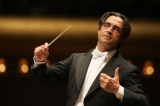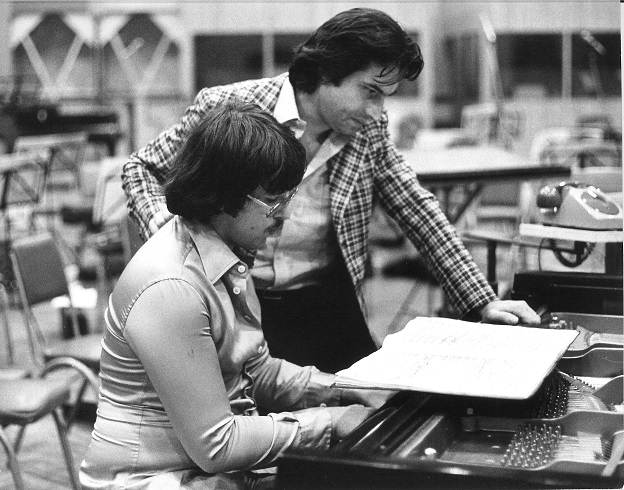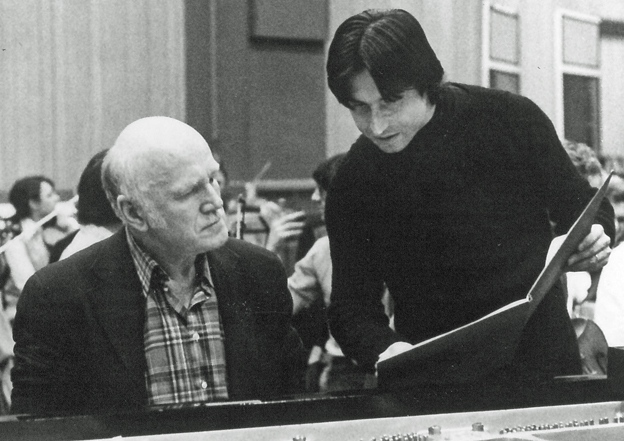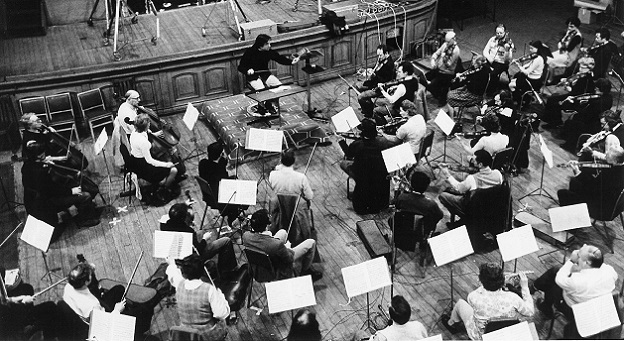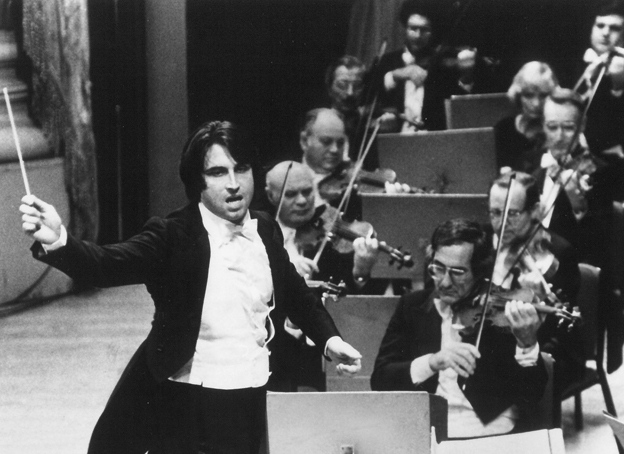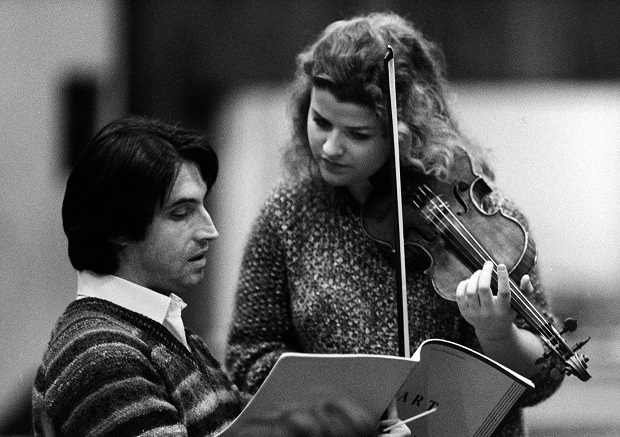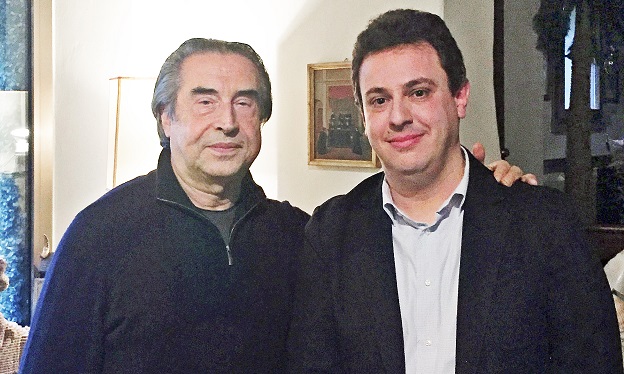I met Maestro Muti at the end of May at his home in Ravenna: after the long interview, in the afternoon we moved to a charming little theater a few kilometers from the city for the Cherubini Orchestra rehearsals. This is the Teatro Socjale, inaugurated exactly 100 years ago and built at the behest of the local cooperative of farm workers who taxed themselves for this purpose. And Muti (who, during the Ravenna Festival, inaugurated another tiny theater, the one in Marradi, between Emilia and Tuscany) took the opportunity to make a joke (« I used to conduct at the Musikverein, now I conduct at Piangipane! ») and, more seriously, to insist on the importance of revitalizing the many jewels scattered throughout Italy, entrusting their management to young people. On July 28, the Maestro turned 80, the occasion for me to remember the path of his long career in the light of the Warner box that collects all his ex-EMI symphonic recordings.
As it has often happened in the interviews we have conducted with Riccardo Muti in the last years, the conversation starts very naturally when the Maestro sees the covers of the latest issues of our magazine Musica: this time his eye fell on Andrei Gavrilov, who is the protagonist of several recordings in the Warner box: in detail, Rachmaninov’s Second, Third and Rhapsody and Tchaikovsky’s First. Precisely by recalling this last recording, Muti begins to speak about the Russian pianist.
He came into the studio, the London Philharmonic was lined up, and he immediately said, « Let’s do a real Tchaikovsky, Russian style! » The professors were dumbfounded, but then once he sat down at the keyboard, they immediately realized what a musician he was. Debatable, perhaps, but technically splendid. And years later, in Philadelphia for Rachmaninov, to give the A to the orchestra he gave a tremendous bang to the key on the piano so that I had to get off the podium, play the same note softly and say « The soloist meant it that way » ».
Have you listened to these recordings again?
I don’t like to re-listen to what I’ve done in the past, it almost never happens to me, because I find that records photograph a very precise moment, which depends on ever-changing factors. Even in the recent tour with the Wiener, the same program was performed three times in an always different way, depending on the audience, the acoustics, the atmosphere. And I enjoy, even within the integrity of the setting, introducing constant changes: that’s what makes a performance interesting. In any case, I would like to hear once more these discs with Gavrilov: I remember being surprised by certain sudden surges of his, but also that Richter – whose collaboration with me has been so often recalled – admired him greatly.
The difference, perhaps, is that Richter was never demonstrative, always looking for poetry: I remember, when we were recording Beethoven’s Third, he kept looking for the way the continuous modulations should come naturally. He was looking for simplicity through tireless work: an apparent contradiction. And if Richter was the poet, Gavrilov was the pyrotechnician.
This collection contains your symphonic recordings from 1973 to 2007, but the bulk coincides with the twenty years 73-93, the Philharmonia and Philadelphia Orchestra years; and it opens and closes in the sign of Cherubini. How was it possible to start a recording career with the rare Requiem in D, which was almost absent in the discography at the time (there was Markevitch’s version)? Did you not encounter resistance?
The love for Cherubini accompanied me from the beginning: it wasn’t born through the study of piano, but from the admiration for the musician. In 1968 I became director at the Maggio Fiorentino, and Cherubini’s name was well known.
Maybe there was still an echo of Callas’ Medea!
Yes, even if it was not a truly original Cherubini: if I were to conduct the opera today, which many people ask me to do, I would naturally have to go back to the first version, the French one. But going back to Cherubini, the name was in the air: the Conservatory of Florence is named after him, and many years later I would have done the same with my youth orchestra. Vittorio Gui and I were talking about Cherubini and his relationship with Beethoven. At a certain point, I came across this score of the Requiem in D for male choir and orchestra without violins, composed by Cherubini for his own funeral. It is much more difficult to perform than the one in C minor: but it is a masterpiece. The managers of EMI accepted the proposal, because a record, at that time, was not only a commercial act, but the definition of the personality of the new interpreter that the record company welcomed. And in the following years I recorded a lot of Cherubini’s music: it’s something I’m proud of. Cherubini teaches phrasing: he doesn’t write for the audience, but for the music itself, he is not a great melodist, he is an author of great symphonic architectures.
Many recordings were done with the Philharmonia: or rather, at the beginning, the New Philharmonia, since the orchestra had been disbanded after Legge left. What orchestra was it at the time? There are interviews with some of the musicians of the time and they all describe you as « very demanding » and capable of leaving a fire that the other conductors also benefited from.
I’m glad to remember those years: I debuted in London on December 1, 1972 with William Tell’s Overture, Prokofiev’s Second Piano Concerto with Rafael Orozco and Mussorgski’s Pictures from an Exhibition. I was a stranger in England, but after the dress rehearsal (not after the concert, that could be – or not — a success with the public and the critics), the orchestra committee asked me if I intended to become music director: a very strange thing indeed. I was shocked! My English was very limp, and at that time London boasted the best of conductors, with Solti at the London Philharmonic, Boulez at the BBC, Previn at the London Symphony, Kempe at the Royal Philharmonic, and Davis at Covent Garden. A nice group of conductors in their maturity, while I was only 31 years old and they offered me to conduct the orchestra that had been the one of Karajan and Klemperer who re-founded it as New Philharmonia – it took back its original name only in 1976 – and that was in considerable economic difficulties. After three months of second thoughts, I accepted and a ten-year journey began, flanked by an intense recording activity: some records were awarded, such as Mendelssohn’s Third, which was acclaimed by German record critics.
Any other episodes that you would like to remember from those years?
I’ll go back to Richter, who recorded with me Mozart’s K 482. During a rehearsal, at a certain point he attacked a strange cadenza, which was Britten’s. I remember that both I and the orchestra were quite surprised, it seemed to me another musical world. But he retorted that the cadenza should not reflect the composer’s style, but the atmosphere of the moment. I did not object, but I found it strange. In any case, he played it with such quality that I certainly could not have objected! And at the time of Beethoven’s Third, our first joint recording, I remember that during a pause I asked him anxiously: « Slava, what do you think of my orchestra? ». And he, after a long silent reflection: « English »!
For about three years you overlapped your assignments in London and Philadelphia: what was the main difference between the two orchestras?
The Philharmonia was purely European and, indeed, English in the sense of musical discipline, reading speed and learning ability: an orchestra accustomed to a very intense record production. The Philadelphia Orchestra was and is the ‘Rolls Royce of American orchestras’, as it was defined by some journalists at the time of Ormandy, a great lady full of colors and perfumes, that Stokowski had created, Ormandy maintained and I, during my years, tried to bring towards a more conscious stylistic definition – they were years in which it had become clear that you cannot play Mozart like Bruckner. It worked very well in the impressionistic repertoire, for example. But with them, I repeat, I worked so much in the search for the most exact style for each composer. Philadelphia had more color than Philharmonia, which was stylistically more neutral.
The repertoire contained in this box ranges from the late 1700s to the early 1900s: among the soloists involved is Maurice André. What are your memories of him?
Fantastic memories: we immediately got on well, because he had a great sense of humour and I too, although sometimes I appear severe, love to joke when I’m at ease. I come from the world of the Neapolitan School and the music of Torelli, Telemann, Haydn that we recorded has close ties with that climate. He played it in a simple, direct way, and with great virtuosity. And between the Neapolitan and the French men there were wonderful days, so much so that I invited him to Philadelphia and Washington where, at a gala dinner, I tried for the first time a famous champagne (I had never drunk any!).
In fact, the affinity between conductor and soloist is crucial: have you always had freedom of choice in this sense?
I don’t work very much with soloists, but I’ve never been imposed upon. With soloists I didn’t know, I tried to get information before accepting the proposal: I am thinking of Mutter, who was proposed to me for Mozart when she was a little girl. She came from Karajan, and for me this was a guarantee. I remember that when we met, she opened the violin case and inside, with the instrument, there was a series of photographs of Karajan; and as soon as we started to record, she told me that she would have preferred to play everything in a row, without cuts or adjustments. Now I’m very close friends with Anne Sophie, she’s a wonderful musician: after all, my first violin soloist was Zino Francescatti, so you can see I’m off to a good start! But, beyond the violin, I want to remember my friendship with Teresa Berganza, who came to greet me when, a few years ago, I received the Prince of Asturias Award.
In the box set there is also Brahms’ First with Weissenberg, another artist linked to Karajan: but that Concerto was also the occasion, in 1962, of a famous public quarrel between Glenn Gould and Leonard Bernstein. Have you ever experienced such a wide difference of views with a soloist? And is it possible to move on in such cases?
If the difference of opinion is so strong, like the one Bernstein told live in that so famous and so beautiful speech, the conductor must force himself to be what he is not, to do what he does not feel: it was an act of great generosity on Bernstein’s part. But this is an exception: if the visions are incompatible, the collaboration must be severed at the beginning of rehearsals. It has happened to me to have interrupted collaborations with some soloists with whom I have worked, certainly not out of enmity, but because we no longer found each other musically. Between soloist and conductor there must be a common path. I don’t need to tell you again how my first concert with Richter was born, who wanted to « test » me as pianist before accepting me as conductor. [This was described in previous interviews]
In another interview you confessed that sometimes you had to record music that was not among your priorities – the Suites from Tchaikovsky’s ballets – at the request of the record company: did it happen often?
I wouldn’t say so. And I can’t say that I did it unwillingly from an artistic point of view, because that music is a true masterpiece. Rather, I insisted on less commercial ways: but if I could record seven Cherubini’s Masses, it’s thanks to EMI, to which I had to give something in exchange. But don’t misunderstand: I am very happy to have recorded those Suites with an orchestra of the level of Philadelphia, even experimenting with tempos that some choreographers would find out of place. But I believe that it is the choreography that must take into account the indications in the score, and not vice versa: at La Scala I directed Baiser de la fée, to give the right importance to the corps de ballet, but I did not come to any compromise.
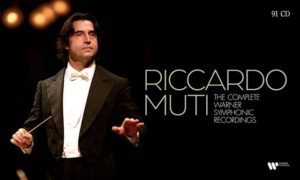 For label reasons, this box lacks Brahms’ and Prokofiev’s Symphonies (released by another label); on the other hand, we have some ‘doubles’, that is Verdi’s Requiem, Beethoven’s Sixth and Seventh, and the last three by Tchaikovsky, a composer with whom you have developed a long and constant relationship. How has your approach to him changed?
For label reasons, this box lacks Brahms’ and Prokofiev’s Symphonies (released by another label); on the other hand, we have some ‘doubles’, that is Verdi’s Requiem, Beethoven’s Sixth and Seventh, and the last three by Tchaikovsky, a composer with whom you have developed a long and constant relationship. How has your approach to him changed?
I loved him even in the periods when as a symphonic composer – and Puccini in the operatic sphere – he was seen by certain intelligentsia with a certain stink under their noses. And in fact, the second disc in this collection is the First, entitled Winter Dreams, which spoke to me directly [he starts humming the Adagio]. And his orchestrations are, even today, perfect: if certain symphonies of Brahms or Schumann have some problem of internal balance – but I do not accept Mahler’s ‘corrections’ to Schumann – those of Tchaikovsky show an absolute science, and find their roots in the music of Mozart, so much so that in the last concert he gave before his death, in which he presented the Pathétique, in the first part he conducted the dances from Idomeneo. I therefore admire both the composer capable of unforgettable themes, which become heritage of humanity, and the cultured musician. I have re-recorded the last three symphonies because, in ten years, a lot of water had passed under the bridge: life experiences (good and not so good), studies, symphonic and opera conducting. I was more aware of the control of the orchestra, freer and less tied to technique. All this have led me to this choice. And I believe that in the second version all this is felt, for better or for worse.
In the last CD, the one with the interviews, many Philharmonia musicians agree that the pinnacle of your joint recording work was the Manfred, a little-performed masterpiece…
I agree, it’s a fine recording, one I’m proud of to this day.
A lot could be said about the presences and lacks of this box: for example, we know that Mahler is not a very frequented author by you, but I am struck by the total absence of Richard Strauss, an author that would be very suitable for American orchestras like Philadelphia yesterday and Chicago today!
I conducted Don Juan, Aus Italien, Death and Transfiguration and The Bourgeois Gentilhomme. Maybe it’s not much, but life is short and art is long, as they say: you make sometimes painful choices. You know very well that for years the Vienna Philharmonic has been asking me to do Tristan: and I still haven’t decided, just as I would absolutely like to conduct Salome and Elektra. But time is running out: in addition, you must consider that, in my various positions as music director, I have had to conduct a great deal of contemporary music, with a not insignificant amount of world premieres, which obviously involve a great deal of study and effort. The case of Mahler, which you mentioned, is different: I really love Mahler when he uses the voice, and for this reason I like to remember the great Christa Ludwig, who left me a rose on the music stand on the occasion of our Rückert-Lieder in Vienna (a memory that is very dear to me). I deeply love Bruckner, I feel at ease in his world, and I am missing three symphonies for the complete cycle: even the Wiener remember the Ninth and Seventh performed together. It’s all about choices, in short: and for Mahler there are already many conductors who conduct him wonderfully well.
You once said to me, provocatively: « Have you ever seen a conductor have a failure with Mahler? »
This is a statement by Francesco Siciliani, and it has a basis of truth: even in the Ninth, which does not have a bombastic finale, there is such a metaphysical ascent that the audience almost has a physical need to unload itself in applause. Today Mahler is a bit overused. To celebrate him, in Chicago, I did not conduct his music but repeated the last program of Mahler as a conductor.
But I insist: imagine the Symphony of the Alps with the Chicago brass!
And that’s not to say I won’t conduct it, although, in detail, I find it has wonderful moments juxtaposed with others that are overly demonstrative. But since – if the Parcae will allow me more time – I have more years ahead of me with the CSO, I’ll keep your advice in mind!
When you are in the studio for a recording, do you direct differently? Do you ‘dare’ more?
For me it has always been a struggle to record in pieces, maybe in a different order from that of the score: that’s why, especially in the last years, I prefer live versions. I am thinking of Cherubini’s Masses, which I recorded live and without corrections with the wonderful choir of the Bavarian Radio. The recording, where one knows one can repeat, risks taking away tension and adrenaline.
I ask you two more technical questions: do you change, depending on the repertoire, the positioning of the strings and the length of the baton?
Really? I had never heard that one… no, I always use the same one! Once Guarnieri, the famous conductor, was asked if he preferred the baton with or without the cork: and he, as a good Venetian, answered that « we stay afloat even without the cork »! The Italian conducting technique is based on the wrist, and it is the same even if – paradoxically – the baton is not used: and in the last years I have reduced a lot the gestures. But, mind you, even when I don’t seem to be conducting, that’s where I exercise the most control. As Kleiber said, it would be nice to conduct an orchestra without conducting.
As for the first question, I started as a boy with the classical arrangement, with the cellos on the right: and that’s the position I love and always use. I also like the cellos to be in the center, with the double basses behind, as at the Musikverein: and from the Wiener I also accept, for the New Year Concert, the position of the second violins on the right. But otherwise, I repeat, I use only one arrangement for any repertoire.
But, in the end, are you satisfied with this CD collection? What are you most proud of?
In the symphonic repertoire, one can never be satisfied. But if there is one complete cycle I am proud of, it is Scriabin’s with Philadelphia. When I worked with Trifonov a few years ago, we talked a bit to get to know each other, and he confessed to me that he always listens to Scriabin’s Symphonies conducted by me! And then I am proud of the recordings of the Sacre and Petrushka with Philadelphia: but I cannot forget Shéhérazade either.
Riccardo Muti: Balance zwischen temperamentvoller Dramatik und romantischer Gefühlswärme










